
|

|

|

|

|

|
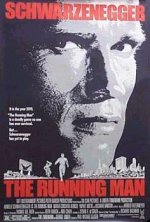
"The Running Man" (http://www.imdb.com/title/tt0093894/)
Directed by Paul Michael Glaser
TriStar Pictures
R / France: 12
1987
Reviewed by a contributor December 9, 2004
This movie would be good to see for someone who doesn't understand the appeal of TV shows like "Cops." "The Running Man" also illustrates the real-world polarization of the u.$. working class into bourgeois workers and lumpen proletarians, and illustrates how it is possible for automation to exist simultaneously with poverty. "The Running Man" appeals to the eroticization of power, but also parodies it. Also, "The Running Man" raises an interesting point about the relationship between sadistic entertainment media and imperialist militarism.
Ben Richards, cop turned rebel
"By 2017 the world economy has collapsed," but luxuries and futuristic automation exist in the imperial metropoles of the united $nakes. Not everyone enjoys these conveniences and luxuries at the same levels. People live in a shanty town on the outskirts of Los Angeles. There are tight controls on movement within the city, and a nighttime curfew. The government censors art and encourages children to report their family members' violations of the law. A "game show," seemingly popular with everyone except a group of revolutionaries, stars celebrity, carnivalesque, WWF wrestler-like "stalkers" who pursue and sadistically kill government-supplied convicts; there is a sort of entertainment-military complex. The TV show also invites viewers to commit crimes in order to become contestants on the show. Named "The Running Man" ("Running Man"), the show is popular with gamblers, too. The government believes that "The Running Man" pacifies the population, and prevents them from picketing and rioting. The ICS network broadcasts another openly sadistic reality show. In the "Wilshire Detention Zone," "detainees" do digging and welding work at what looks like a construction site; armed guards watch them. The detainees wear neck collars that explode if they try to cross a "perimeter" to escape from the zone. Oh, and Arnold Schwarzenegger gets the girl.
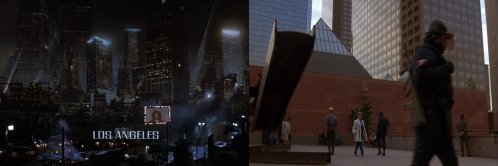
"RoboCop" (1987) and "The Running Man" came out in the same year, 1987. These two movies are remarkably similar to each other in that they both depict a "good cop" who joins up with an underground resistance movement against an evil, omnipotent, omnipresent "mega-corporation." Just looking at things inside the united $tates, the late 1980s were a time of intense gentrification, continuing "white flight," increasing homelessness rates, "drug" war against oppressed nationalities, social service cuts, and financial and industrial deregulation, among other things. Both "RoboCop" and "The Running Man" may have been a response to some of these processes. Coincidentally, five days after "RoboCop" premiered on July 17, 1987, Ronald Reagan reluctantly signed the ineffective, token Stewart B. McKinney Homeless Assistance Act into law.
Since politically superior "The Running Man" premiered four months after "RoboCop," we can say that there was some kind of progress in Hollywood; although, the correlation of "The Running Man"'s better politics with the movie's later release is probably just a coincidence.
Both "RoboCop" and "The Running Man" support the idea of "bad cops" and "good cops," which is a distortion of reality. What's better about "The Running Man" is that "The Running Man" does not end with the mistaken idea that the bulk of the members of the police force, an institution of the Euro-Amerikan nation, do not repress exploited and oppressed people. In contrast, the ending of "RoboCop" suggests that the rank-and-file of the Detroit metro police are progressive compared with the pro-OCP (this movie's "mega-corporation") pigs. Although, tactically speaking, it is sometimes correct to prefer "good cops" to "bad cops," what "RoboCop" does is wrong in failing to show how every government-sanctioned police organization in the united $nakes is, in the main, the enemy of exploited and oppressed people. "The Running Man," on the other hand, does not end up glorifying any such police; although, the movie takes the decidedly Liberal(1) view that problems with the criminal injustice system lie in infringements of Constitutional rights.
At the beginning of "The Running Man," we see Ben Richards (Arnold Schwarzenegger) piloting a military or police helicopter. A commander of some kind orders Ben to disperse a "food riot" by "eliminating anything moving." Ben objects to firing on the 1,500 "helpless" unarmed rioters. He is particularly bothered by the fact that "there are lots of women and children down there." Ben disobeys the order to suppress the riot and instructs his crew to return to base. The same commander on the radio orders the officer seated next to Ben to detain Ben and "proceed as ordered." While Ben is disagreeing with his commander on the radio, Lieutenant Sanders looks tired and doesn't seem enthusiastic about attacking the rioters himself, but he still moves to detain Ben after the commander tells him to. Ben blocks Sanders, and the rest of the crew rush to help Sanders. One of them, struck by Ben, angrily knocks Ben out with the butt of his rifle. "I'll see you in hell," he says.
The ICS network uses edited video from the helicopter to portray Ben as disobeying an order to not fire on the crowd. Ben is sensationally called the "Butcher of Bakersfield" (California, probably).
Ben had probably been following orders up until this point. The script could have done more with character development along these lines to show how Ben arrived at his conclusions and a process of criticism and self-criticism. Though Ben obviously makes the right decision in the scene we see, the movie leaves most of Ben's history up to the viewer's imagination. "The Running Man" suggests a distinction between "bad cops" and "good cops," without getting into what causes some pigs to become whistle-blowers or insubordinate.
At the same time, however, "The Running Man" portrays Ben as being a kind of rarity. After Ben cooperates with a couple of revolutionaries to escape from prison, they take him to a hideout in Los Angeles. At the hideout, there are more revolutionaries, one of whom is named "Mic" (played by the real-world Fleetwood Mac drummer Mick Fleetwood). Mic says that "people like [Ben] took this country and turned it into a jail." Mic understands that Ben is "a cop." That's all that Mic needs to know. To Mic, there are no "good cops." William Laughlin (Yaphet Kotto), who is Black and one of Ben's fellow escapees, says that "[Ben's] not one of us."
A subjectivist understanding of fascism
According to the rolling background text at the very beginning of the movie:
By 2017 the world economy has collapsed. Food, natural resources and oil are in short supply. A police state, divided into paramilitary zones, rules with an iron hand.
Mic complains about his songs being burnt, among other things. In the united $tates depicted in "The Running Man," there is banned clothing and banned music--under the dictatorship of an imperialist bourgeoisie. It seems that there is also some kind of restriction of the number of sex partners a persyn can legally have each year (Phil's lie comment about Amber's sexual activity). Ben is surprised to see Amber's music "synthesizer setup" as if the composition and performance of music were regulated, too.
The prevailing definition, in the united $tates, of "fascism" makes little distinction between fascism, and "authoritarianism" or "totalitarianism." According to this definition, fascism is a strong form of authoritarianism, maybe accompanied by jingoism or racism. The definition ignores the conditions, particular to imperialist countries, that give rise to fascist politics.(2) A strong indicator that a movie is drawing from the prevailing ahistorical understanding of fascism is demonization of a government for the reason that it prohibits people from making lifestyle decisions in a general way. Thus, just in this film, clothing restrictions and capitalists making money and political stability from manufacturing crimes for modern day gladiator tournaments come lumped together, when in fact the same class that benefits from the gladiators also benefits from propagating a belief in creating a lifestyle through the purchase of varied luxury goods.
This reviewer can't claim to know much about Fleetwood Mac though their lyrics don't seem to be anything special politically. He needs to put things in perspective and pay more attention to the poor people surrounding him in the shanty town, for example. As wildly popular as Fleetwood Mac was, if it had led in a correct political direction Mic and other artists would not find himself in the situation they were in in the "Running Man." Certainly Fleetwood Mac profits from romance culture schlock, the type of which de-politicizes people and paves the way for "Running Man" style political systems.
After escaping from prison, Ben goes to his brother's place. There, he finds a new tenant, Amber Mendez (Maria Conchita Alonso), and learns that authorities took his brother away for "re-education," which is meant to conjure up anti-communist or Orwellian images. Trying to disarm Amber, Ben, in that amused look-what-we-have-here kind of way, criticizes Amber for having banned music cassettes and "blackmarket clothing" in her possession. The movie does not identify the music; the clothing seems to be stylish, maybe retro. What's important to the movie is that some kind of clothing, some kind of music are banned. What's important to the movie is that some lifestyles are banned, the specifics being unimportant. Ben discovers a wad of paper currency, u.$. bills, in the same box.
"Come on. Everybody does it," says Amber, who wrote the "ICS" network's theme song. It's as if Amber were a hypocrite by indulging in banned products, but working for the ICS network. Like bourgeois governments everywhere, the government in "The Running Man" selectively enforces laws against possessing banned products.
In "The Running Man," there are brief indications that the population can buy only a limited number of brands, or a limited variety, of luxury products. The network advertises "Cadre Cola." There is a "Cadre Infonet." There is a "Cadre" credit card. In addition to these, there is the banned art and clothing. "The Running Man" is wrong to put this lack of luxury goods variety in the context of poverty in order to suggest that it is oppressive for a government to restrict the luxury goods that the population can buy.
Today in the real world, certain kinds of clothing, symbols, and even music are banned, for example, in schools and workplaces. Also, the accumulation of capital, and the patriarchy, limit the kinds and proportions of art and clothing that exist, including in the united $tates. While MIM opposes the creation of environments in which it is even more difficult to have progressive political speech, it is important to recognize that "free speech" is a myth and does not exist in the first place. Not only that, but there can be no free speech while there is any kind of class dictatorship. Even under communism, without a state apparatus, it will be culturally less possible / impossible to say certain kinds of things. At the same time, MIM allies itself with those who seek to defend "free speech" under capitalism. Under capitalism, a ban is merely a form of business competition and a source of government graft. That goes also for governments claiming to be communist when they become tied up with capitalism.
The regulation of luxury goods would concern MIM to the extent that it had a bearing on the repression of political speech, but even the control of persynal mobility in the world in "The Running Man" is presented in a way that does not show how mobility restrictions arise to benefit capitalists seeking competitive advantages. Mobility restrictions also occur during wars, sometimes with good reason.
An announcer on an outdoor TV screen says that:
Zone passes are required at all times. Display passes properly. All inter-zone day workers with zone passes are reminded that curfews begin at midnight. Anyone without a valid zone card after midnight will be permanently detained. Cadre kids, don't forget, October is bonus-recruitment month. Earn a double bonus for reporting a family member. ICS, your entertainment and information network, remind you: seeing is believing.
Amber, who works at ICS, needs a "travel pass" to leave her "quad." The same pass allows her to travel by air (including supersonic Concordes according to a sign at the airport). "The Running Man" could have got into how the passes are related to social control and the forestalling of the revolution, but instead, it focuses on the so-called authoritarian or totalitarian impact that the intra-city mobility restrictions have on the so-called innocent public, or the average, innocent Jane or John Doe. This reflects the Liberal idea that the "private" liberties of the "innocent" ought not be infringed upon. Related to this idea is the idea that there is no class dictatorship in capitalist society, but only an opposition between the government and "private" interests.
"The Running Man" also panders to the sentiment that children's government-encouraged reporting of their parents' crimes is inherently oppressive, when it is not. There is a distinction between bourgeois and patriarchal moralities, and communist morality, and a distinction between bourgeois legality and socialist legality--distinctions that "The Running Man" does not recognize. Moreover, there is nothing sacrosanct about the child-parent relationship that makes it above questioning and possible criticism. The idea that the government (in an ahistorical sense) should not intrude into the private sphere, including the household, is a Liberal and particularly patriarchal one.
Ben's survival motivation and the movie's Liberalism
(Weiss) You can still join us if you want to.
(Ben) No, thank you. My brother's going to get me out of the city. Plus, I'm not into politics. I'm into survival.
One of "The Running Man"'s best elements is its depiction of a polarization of the urban population into exploiters and lumpen proletarians, which is accurate for the united $tates today. One of the persyns who stands among the so-called masses(3) to watch the "Running Man" show on an outdoor TV screen, and to bet on the show's contests, is able to bet $200 all at once, but the people who reside in the shanty town on the outskirts of Los Angeles inhabit inadequate, makeshift housing exposed to the weather. The revolutionaries who live in the shanty town are sick of watching "The Running Man."
After Mic removes the exploding security collar from Ben's nick, the revolutionaries arrange for him to leave the area by way of a hired truck, disguised as a construction worker. Ben wears what looks like an ID card, maybe one of those zone passes. The computer expert Harold Weiss (Marvin J. McIntyre) tells Ben that he can still join the revolutionaries. Ben refuses, saying that he will to go into hiding. With the exception of Mic, the revolutionaries' social origins aren't clear. (Weiss has a bourgeois "computer nerd" vibe, but maybe he learned his skills at a public library.) At this point, however, Ben's own class position and class origin are matched. Later, Ben changes his mind after the police catch him and the "Running Man" show host Damon Killian (Richard Dawson, of "Family Feud" fame) forces him to be a contestant on "The Running Man."
Ben's seeming political development is one of the better elements of "The Running Man." So is Amber's willingness to help Ben and her realization of the truth of "The Running Man." (What's good about this is Amber's willingness to question what the media and the military court(s) have said about Ben's being the Butcher of Bakersfield, not that she helps Ben only after they come in contact with each other, and only after Amber watches a new report about Ben and herself at the airport that is obviously false.) However, Ben's joining up with the revolutionaries is more out of necessity:
(Ben) [Damon will] never let us out of here alive. They can't afford it. They'll get the police, the army, and hunt us down like dogs, off camera of course.
In Ben's view, what's wrong with the network is that it makes up lies about contestants on the "Running Man" show. "The Running Man" movie does not show what Ben thinks about the conditions in the shanty town, or what he thinks about the revolutionaries' ideas, except that the revolutionaries, he thinks, have been all talk, but no action.
The movie itself does not pay much attention to the revolutionaries' ideas. The viewer gets the impression that they are resisting the "police state" and the ICS network, that they defend the food rioters whom the Butcher of Bakersfield allegedly killed, and that they have complaints about restricted consumption choices (Mic's banned music, the network's broadcasting reality TV shows 24 hours a day, seven days a week), but that's it. "The Running Man" never shows Ben advancing beyond the idea that unarmed food rioters should not be killed--to the idea that the conditions that create subsistence food shortages in the first place should be eliminated. "The Running Man" never even shows the revolutionaries as having this idea.
"The Running Man" does not answer this question. By failing to move away from the guilty-innocent dichotomy, the movie reinforces the idea that there is nothing problematic about repressing people who really did commit crimes. One of the "fabulous prizes" on the "Running Man" show is a trial by jury. The viewer is supposed to be shocked that the Seventh Amendment is no longer being enforced. But this ignores that things like "due process" and jury trials serve to legitimize the justice system, which is an instrument of repression and social control.
Entertainment media as social control
(Ben) The truth? Hasn't been very popular lately.
Where "The Running Man" does touch on issues of social control is in its depiction of the ICS network's TV programming. ICS network employees believe that "The Running Man" keeps people from protesting.
On the phone with the Justice Department after Ben kills a stalker, Damon reminds them that they would rather have people in front of their TV sets than on picket lines. In an ICS broadcast studio, an employee says that there is a "big crowd tonight," referring to a congregation below an outdoor TV screen just outside the ICS building. (It's not clear what the employee is referring to the professionals or the non-professionals--there are two groups of outdoor viewers in the movie.) A second employee says, "Better there than in the streets."
What the relationship is between the government and the ICS network isn't clear. For example:
(Brenda) Damon, you know our contract, we never get military prisoners.
(Tony) Who's a military prisoner? He's still at large.
(Damon) Yeah, well they'll get him for me. Cadres can't have it both ways.
Damon refers to "Cadres" as if they were some kind of authority. Cadres apparently manufactures firearms, but also consumer goods. Since the "police state" is supposed to be divided into "paramilitary zones," Cadres may be a corporate conglomerate with its own army.
Based on what Laughlin says, the ICS network, by itself, is powerful enough to close schools and force children to enlist in the military. "The kids are either in hiding or getting basic training, brainwashed by the TV." The implication is that ICS' sadistic reality TV shows are conditioning children to behave sadistically during combat.
Amber watches an ICS show named "Climbing for Dollars." On "Climbing for Dollars," a man climbs a rope to grab u.$. bills. Beneath him are barking, biting dogs. The man falls. "CLIMBING for DOLLARS will be right back." The station switches to a commecial as if to leave the viewer in suspense.
This raises an interesting point. Instead of trying to lie about the united $tates' wars against exploited and oppressed people, the media could lessen the importance of "news" in the first place by encouraging people to focus on sadistic reality TV shows. This would kill two birds with one stone: the inculcation of sadistic thinking (or just feelings) in the population, and distracting the population from reality by giving them a "reality" (reality TV) that is not the truth.
According to last week's Nielsen ratings, neither "Apprentice" nor "Survivor" were among the top three shows in terms of either number of households, or number of individual viewers, during the average minute.(4) So, maybe the real world doesn't yet look like the world in "The Running Man"; the "Running Man" show is supposed to be "the most popular program in history." Still, entertainment TV programs have higher ratings than news programs, which says something about the population's priorities even though watching "the news" has its own problems.(5)
The distinction between reality TV shows and non-reality TV shows may not be that important though the reality genre raises more questions about representation, sadism, and voyeurism. For example, "CSI," "E.R.," and "Without a Trace," also induce feelings of distress and fear in viewers just as in the reality shows that people watch out of morbid curiosity.
Sadism
On the "Running Man" show, the announcer Phil (Rodger Bumpass) says that Amber "has flaunted [opposed] the law and traditional morality all of her life." "Traditional morality" seems to include public misogyny (Ben's physically and verbally aggressive behavior toward Amber--"Can't live with them [wimmin], and you can't live without them") and sadism. The "Running Man" show itself seems to be part of a larger culture of sadism--in a nationalist context. In an ICS office, there is a "The Running Man" "stalker" poster that reads: "Pain : American Style." At one point, Amber changes her TV's channel to an exercise show. The fitness trainer, beefy, buff Captain Freedom (Jesse Ventura), tells viewers:(Captain Freedom) Are you ready for pain? Are you ready for suffering? If the answer is yes, then you're ready for Captain Freedom's workout! . . . That's the ticket: no pain, no gain.
Captain Freedom is a former "stalker" on the "Running Man" show. An announcer on the exercise show calls the show's viewers "runners." By exercising with this show, viewers are fantasizing being hunted by "stalkers" on the "Running Man" show.

In fact, much of the culture is oriented toward sadism, which is particularly disturbing in the context of the militaristic culture. As in a Captain Freedom workout, pain is no longer "collateral damage" or an "unintended consequence." Experiencing, as well as inflicting, pain have become desirable in and of themselves.
Damon and Phil both call the "stalkers" on the "Running Man" show "patriots."
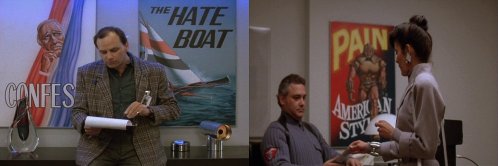
Seeing Ben as the guards take him to the "Running Man" studio, Amy (Dey Young) excitedly says to Amber:
(Amy) Boy, you're lucky he didn't kill you too. Or rape you, then kill you. Or kill you, then rape you. I mean, a guy like that, what would stop him?
In the world in "The Running Man," there is not only the desirability of power exercised sadistically, but also the eroticization of power--the social construction of domination, and being dominated, as being sexy. During Ben's first encounter with Amber at his brother's place, Ben ties Amber to a weight machine. Both characters are scantily dressed. Earlier, Ben runs after Amber, throws her onto a bed and hovers over her. At the end of the movie, they fall in love--which repeats the typical movie theme of the resistant womyn subdued by the heroism of an irresistibility sexy man.
Damon remarks that Ben himself is "gorgeous," "beautiful" and desirable and associates Ben's biceps with higher program ratings.

"The Running Man" highlights Arnold Schwarzenegger's muscles and suggests his sexiness in other ways. Also, the movie has him in that relationship with Amber, played by a Latino actress, Maria Conchita Alonso. Although the eroticization of power would still have been evident with Amber as a European womyn, it's as if "The Running Man" were caricaturing what MIM has said about the eroticization of power. Not only may Amber be an oppressed nationality ("may"--in a future Los Angeles), Ben is an ex-cop. "The Running Man" appeals to, and supports, the eroticization of power. At the same time, with Captain Freedom, plus the scantily dressed dancing wimmin on the "Running Man" show, the movies mocks entertainment that tries to make use of sex appeal. While Damon introduces Ben on the show, some of the dancers caress Ben as if to tease him. It's like Ben's last (sexual) meal. But the sexy dancing (enjoyed by both men and wimmin viewers of the show) is such an obvious gimmick, even more obvious than cheerleaders at football games, that the movie comes off as mocking movies and shows that make of sex appeal.
Introducing Ben, Damon screams, "Here he is. Ready to pay the price for our home audience, in person, the Butcher of Bakersfield!" Held by guards, Ben enters through dungeon-like doors. Two dancers pull apart Ben's black jumpsuit, bearing the ICS logo, to reveal Ben's "runner" suit, which accentuates his muscles. The studio audience goes from booing to cheering. Ben looks pissed, ignoring the dancers, but subdued. Earlier, ICS doctors/technicians inject a substance between Ben's fingers, maybe some kind of steroids.
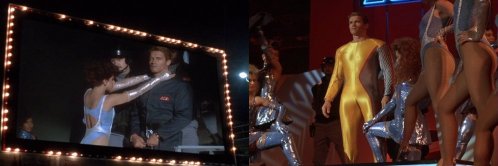
The sadistic treatment of "criminals," in particular, should come as no surprise to today's movie viewers. A little bit more than a year after "The Running Man" premiered in the united $tates, "Cops" (http://www.cops.com/) first aired on TV. Some reviewers have called "Cops" the original reality show.
"The Running Man" is like a hybrid of "Cops" and WWE's "Raw," except with convicts and lethal gladiator-like contests. In the ways in which it appeals to viewers, the fictitious "Running Man" show is like a throwback to public executions, which entertain and scare the population at the same time. Both "Cops" and the "Running Man" show justify punishment in viewers' eyes by highlighting people's alleged crimes. Look at what s/he did, and now they 're going to get what they deserve! "Cops" almost outdoes the "Running Man" show by combining a suspect's arrest, and the portrayal of their alleged crime, in the same, continuous video. A persyn is portrayed as a "suspect," and then the pigs take them down right away. In the "Running Man" show, at least there appears to be a discontinuity between the demonization of the suspect and the "stalkers"' hunting them. Damon shows Ben's alleged crime on the TV, framing him with spliced video. Then , Ben enters through the dungeon gates.
False consciousness?
"The Running Man" draws the right connections between entertainment media and political apathy, and between entertainment media and sadism in a way that is particularly prescient in the context of today's reality shows and today's imperialist militarism.
But "The Running Man" misleads in its portrayal of game shows as a form of social control by suggesting that the "Running Man" show is against the interests of the majority of the population in the united $tates. Perhaps the movie is supposed to depict a future united $tates where the Euro-Amerikan working class has been re-proletarianized, but Euro-Amerikan proletarians aren't visible in "The Running Man" outside the Wilshire Detention Zone--unless viewers count construction workers as automatically being proletarians according to some subjectivist definition, in which case "The Running Man" can be accused of contributing to a misperception of the class structure of the united $tates; although, the group of non-professionals who view the "Running Man" show outdoors consists disproportionately of dark-skinned people who may be oppressed nationalities of the future.
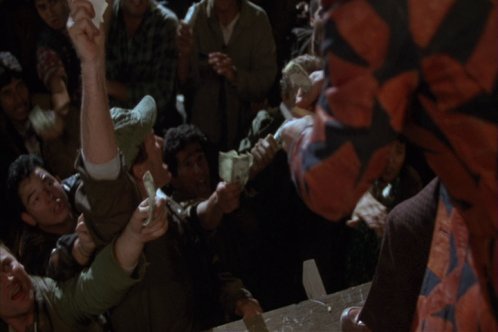
Under capitalism, entertainment media has an ideological effect that ensures the reproduction of capitalism, but that does not mean that consumers of entertainment media are necessarily being duped into behaving against their own interests. As zombie-like as some "American Idol" and "Apprentice" fans seem to be, they still enjoy these shows. They are enjoyable products, not just trojan horses for ideology.
Entertainment media may have the effect of discouraging some bourgeois workers from engaging in pig fests for greater shares of profits, but this would not mean that the vast majority of documented u.$. workers do not benefit from capitalism. To the extent that entertainment media contributes to the reproduction of capitalism, bourgeois workers benefit from entertainment media even though entertainment media may occasionally distract them from their pig fests.
Assume, for the sake of indulging a "false consciousness" understanding of entertainment media in the united $tates, that entertainment media does discourage bourgeois workers' pig fests, but somehow does not contribute to the reproduction of capitalism (which is nonsensical because higher owners' profit rates perpetuate capitalism, but go with me here). So, bourgeois workers are watching shows that are clearly detrimental to their interests overall.
First off, only opportunists and reactionary nationalists are going to shed tears over bourgeois workers' becoming less exploitive. This is nothing new. More interestingly, the assumption that entertainment media does not contribute to the reproduction of capitalism implies not only that capitalism can survive without entertainment media, but also that the system can count on the fact that the u.$. working class, the majority of whom is bourgeois, will support capitalism on their own. This is despite their having smaller-than-average pieces of the pie (that is, greater-than-average, but still negative, exploitation rates indicating that they are exploiters, not exploited). Bourgeois workers don't have to be tricked into supporting capitalism. They do it already. If entertainment media distracts them from their pig fests, but they still tolerate the existence of entertainment media, the reason is that bourgeois workers are satisfied with their already-exploitive incomes and don't feel any overwhelming need to pursue economic demands that would further tie them to the exploitive system.
The "Running Man" show does not seem to be harmful to the interests of its fans. If it is harmful to their interests, then these interests are parasitic anyway. So, the "revolutionaries" in "The Running Man" seem to be trying to do various things. One might be to convince the population that the "Running Man" show is a conspiracy against the whole population--which would be an opportunist thing to do since the population obviously chooses not to care. The revolutionaries might also be "consumer advocates" trying to expand the variety of products available for legal purchase. The revolutionaries are also Liberals trying to restore arrestees and detainees' Constitutional rights.
The movie itself supports an opportunistic orientation toward the typical u.$. citizen--giving u.$. citizens too much credit in a pandering sort of way. After the revolutionaries' "people's network" takes over an ICS satellite and broadcasts the "truth" about the "Running Man" show, the studio audience quickly become angry, even Damon's number-one fan, Mrs. McArdle (Donna Hardy). It's as if they were naturally resentful of the system and had been waiting for an outlet. The two outdoor audiences are quick to celebrate after Ben executes Damon. In actuality, none of the audience undergo any political development. The audience just responds to a few seconds of video, broadcast by the People's Network, proving that Damon has been taking them for a ride. So, this is another confusing element of he movie. "The Running Man" wrongly suggests that the typical persyn in the united $tates has material cause to be resentful of the system, but it rightly suggests that the typical persyn in the united $tates, when they support resistance to the system, does so on the basis of pure sentiment--except in the case of the lumpen and those being lumpenized such as Ben.
"The Running Man" is confusing in yet another way. At first, Ben follows the lead of Laughlin and Weiss--again, more out of necessity (and out of confusion, while on the "Running Man" show), but this reflects the reality that less politically advanced persyns will follow the lead of more politically advanced persyns who are probably more informed, too. But later, as if Mick Fleetwood's being the leader of the revolutionaries were not bad enough, Ben assumes that Mic's armed contingent, sent to secure the People's Network's illegal broadcast, does not have any experience and takes leadership of the group.
(Ben) These kids? That's a bad move, Mic. They need a leader. They need someone with experience [me].
So, the People's Network needs a white ex-cop to be successful.
Incapacitation by remote control
Viewers of "The Running Man" are often shocked to see the detainees' exploding neck collars. In fact, not only is such technology possible in the real world today, there are already remotely controlled stun belts, and now, there are GPS- and wireless-enabled persynal location-tracking devices marketed for use with offenders (iSECUREtrac Corporation, Pro Tech Monitoring, Inc.). In terms of technology, it is just another step to add stun or even explosive functionality. Other movies beside "The Running Man," such as "Batoru rowaiaru" (2000) and "Face/Off" (1997), have featured remotely controlled incapacitation devices.
An intensification of white and other reactionary nationalism in the united $tates would make the violent remote control of persyns' mobility more palatable. Picture a GSP-enabled persynal location-tracking device, with stun functionality, as a condition of a persyn's entry into the united $tates. Even today, monitoring technology like this is just a matter of connecting a few wires.
Automation and scarcity
At first glance, "The Running Man" seems to contradict itself by saying that there is resource scarcity in the world, but showing futuristic automation. Amber turns on her lights, TV, coffee-maker and toast-maker with her voice, for example. In the shanty town on the outskirts of Los Angeles, there is an outdoor TV screen, electricity, and neon lights.
Actually, these situations in "The Running Man" aren't that far from the truth; although, "The Running Man" should have shown what was going on in the rest of the world. In Capital , Marx shows that as production becomes more automated (which implies, but does not necessarily mean, high-tech consumer goods like voice-controlled kitchen appliances--Dave Johnson, 1999 February, "Now You're TALKING - voice-response systems for home offices - Product Information," Home Office Computing , http://www.findarticles.com/p/articles/mi_m1563/is_2_17/ai_53744871), growth in the demand for labor may fall below population growth, resulting in unemployment. This is one cause of unemployment.
It is realistic to have futuristic automation next to "scarcity" in the form of poverty; what is happening in "The Running Man" is a hoarding of the resources that do exist. The juxtaposition of abundance and automation in imperial metropoles, on the one hand, with poverty on the outskirts of Los Angeles (and, movie viewers could assume, poverty outside imperialist countries) is one of the movie's best aspects. Also, it explains why there are the tight, intra-city movement restrictions in the world in "The Running Man," and inter-city migration controls. The unemployed, those who have succeeded in crossing the borders of the imperialist countries, are throwing themselves against the citadels of imperialism out of starvation.

Overall, "The Running Man" (1987) is a good movie compared with other movies, such as "Lethal Weapon" (1987) and "RoboCop" (1987). While it does get mixed up with the romance culture, "The Running Man" does not encourage contentment under the system. And it does not portray the bulk of u.$. white workers as being exploited. An accurate portrayal of the internal class structure of imperialist countries looms in the background in the movie, and the movie's theme of sadistic entertainment media in the context of militarism is extremely prescient. At the same time, "The Running Man" slips into Liberalism and opportunism at some points. In the real world today, opportunism is more dangerous than Liberals' supporting Constitutional rights on the basis of Liberal ideology, so I wouldn't beat on the Liberalism point too much. The "revolutionaries" in "The Running Man" never actually call themselves "revolutionary," so it would be like criticizing a prisoners' rights mass organization for not being revolutionary when they weren't even claiming to be revolutionary in the first place. Although this review calls Mic's People's Network "revolutionary" for the sake of simplicity, movie viewers should keep in mind that just being willing to use guns doesn't make an organization revolutionary.
Also, the fact that "The Running Man" may even discourage contentment, and encourage discontent, does not automatically make it a good movie. As the recent review of "The Machinist" (2004) points out, discontent may be an expression of budding white nationalism. However, "The Running Man" is particularly good to see for persyns who aren't sure why shows like "Cops" and reality TV shows are popular with Amerikans. And clearly, "The Running Man" mocks the culture of sadistic militarism that existed in 1987 and exists now. This is the case even though "The Running Man"'s violence is sometimes gory. It is violence suffered under (the exploding neck collars), or directed toward (Ben's killing of ICS guards), the system of repression. Or directed toward symbols of entertainment media under the imperialist-patriarchy (Ben's killing of the "stalkers" on the "Running Man" show, and Ben's execution of Damon).
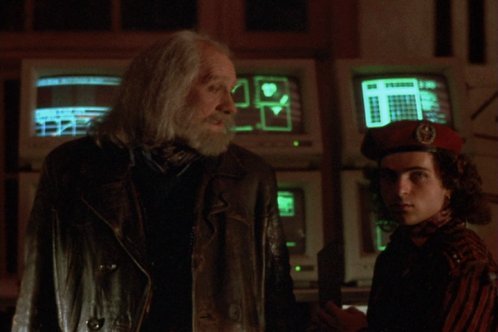
Notes
1. "Definition of Liberalism & What is the difference between Liberalism and Communism?," from MIM Web site, http://www.prisoncensorship.info/archive/etext/faq/liberalismdef.html
"Preparing for the all-round dictatorship of the proletariat: Combating subjectivism in all arenas, from cigarettes & drugs to sectarianism and white chauvinism," from MIM Web site, http://www.prisoncensorship.info/archive/etext/faq/subjectivismI.html
"Who are you to decide? Who made you God?," from MIM Web site, http://www.prisoncensorship.info/archive/etext/faq/whoareyoutodecide.html
2. "Definition of fascism," 2002, from MIM Web site, http://www.prisoncensorship.info/archive/etext/wim/cong/fascismdef.html
3. MC5, 2001 April 19, "Again on the subject of the 'masses' in the imperialist countries," from MIM Web site, http://www.prisoncensorship.info/archive/etext/wim/cong/onmasses01.html
4. "Nielsen Media Research Top 20 : Week of Nov. 29-Dec. 5, 2004," from Yahoo! , cited on 2004 December 9, http://tv.yahoo.com/nielsen/
David Bauder, "CBS dominates November 'sweeps'," Associated Press News Service , from Ottawa Sun Online , cited on 2004 December 9, http://www.ottawasun.com/TelevisionRatings/us.html
5. "TV News and Ratings Information 12/07/04," from top5s.com , http://www.top5s.com/tvnews.htm
6. "Revolutionary feminism," from MIM Web site, http://www.prisoncensorship.info/archive/etext/gender/